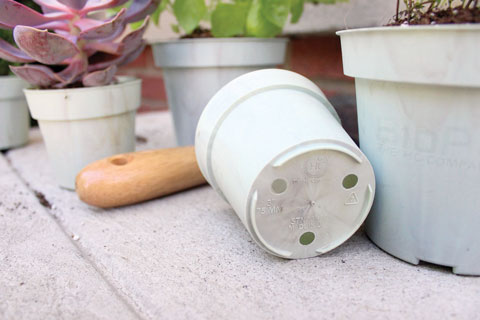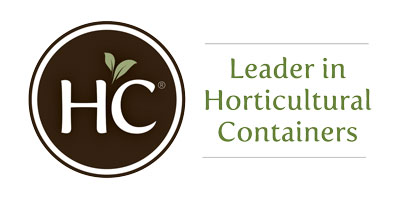9/1/2021
Biobased Growing Containers
Craig Ruvere

There’s no refuting that the global pandemic continues to reshape and redefine our lifestyle and behavioral choices. An unprecedented amount of time spent in solitude has recentered and refocused our perceptions of daily life and the current state of our global society as a whole.
One mindset to emerge after what’s been a challenging year for so many of us is our overall impact—our uncon-scious contribution—towards the detriment of our shared environment.
In a recent survey conducted by Kearney Management Consultants, participants were asked about their interest in sustainability and environmental products, and whether their opinions had changed due to COVID-19.
• 48% said the pandemic had made them more concerned about the environment.
• 55% said that as a result of their COVID-19 experiences they were “more likely to purchase environmentally friendly products.”
• And a surprising 78% of consumers now believe that companies could be doing more to help them make decisions that improve environmental outcomes.
But growers today seem to struggle with marrying profits with sustainability—often believing that the two couldn’t possibly work together in perfect harmony. But several scholars trust the approach that implementing sustainable practices into an organization is an invaluable differentiator.
Professor Knut Haanaes of the International Institute for Management Development in Switzerland says, “Simply put, sustainability is a business approach to creating long-term value by taking into consideration how a given organization operates in the ecological, social and economic environment. Sustainability is built on the assumption that developing such strategies fosters company longevity.”
HC believes in such a long-term value. Sustainability is essential to ensure that consumers and businesses improve the world as collective stewards of the earth, as well as improve the lives of its citizens and the products we develop and promote.
For over 30 years, HC's been producing sustainable fiber growing containers for growers throughout North America—satisfying consumers’ increasing demands for more sustainable options.
“HC is proud to offer its customers a comparable and more sustainable alternative to the resin containers so many growers are familiar with,” said Jessica Benoit, Director of Sustainability Solutions at The HC Companies. “Consequently, consumers can feel positive knowing that their purchase is not contributing to the problems of overburdened landfills. It's a win-win for everyone and HC is just getting started.”
Now the advent of a new sustainable growing container is here. It's known as BioPax.
By incorporating a sustainably sourced wood pulp material with no harmful PFAS or heavy metals into the production process, BioPax growing containers are manufactured using renewable biocontent that doesn’t compromise the performance and integrity of the containers growers know and trust.
Additionally, they’re non-GMO, non-toxic and are part of the USDA’s BioPreferred Program, which focuses on developing and expanding markets for biobased products.
“Our sustainable focus revolves around four core themes: biodiversity, water use, waste reduction and education and engagement,” said Jessica. “We recognize that each grower and customer differs as to their product requirements. Therefore, BioPax expands our commitment for a full portfolio of containers to accommodate the entire industry with products inspired by one or more of these environmental themes.”
Currently, the containers are available in 3-in. and 4.50-in. rounds and are designed for reuse. In addition, they can be more responsibly disposed of with other waste products, as the material naturally breaks down with the aid of microorganisms without leaving behind any harmful microplastics.
To help further differentiate BioPax growing containers in the market, they’re offered in what’s known as "EcoGreen" coloring. The containers have a marbled appearance, which is a result of the production process. The color concentrate and wood-based material create a unique swirling effect, ensuring every product is a one-of-a-kind original, which will undoubtedly differentiate your product in the market.
While BioPax may very well be a manufacturing marvel, it’s imperative that we circle back to the reality above of profits vs. sustainability and how growers can marry the two together successfully. It’s a viable concern for growers across North America, and rightfully so. But we shouldn't underestimate the power of the consumer's choice, and right now, their choice towards being more environmentally conscious is shifting.
The U.S. Chamber of Commerce estimates that in the U.S. alone, spending on sustainable products will balloon to $150 billion by the end of 2021 (or 25% of all goods sold). It's worth noting that U.S. consumers spent $107 billion dollars on sustainable products in calendar year 2014—a 33% increase.
The Chamber adds, “Across industries ... sustainability is no longer a siloed conversation as sustainably minded consumers grow their voice and demonstrate their purchasing power. Gone are the days when sustainability was a passing trend or relevant for only a certain customer profile. Today, the sustainable consumer isn't one type of person, but a collection of people from all walks of life interested in—and actively committed to—a wide range of social and environmental issues.”
According to GreenPrint, a global environmental technology company, in a recent survey, 64% of Americans said they’re willing to pay more for sustainable products designed to help the environment. This supports the notion that profits vs. sustainability are a reachable and scalable target for growers today, given a more sophisticated and demanding consumer.
For growers who’re still leery of adopting sustainable growing containers into their operations, it’s essential to remember that such a shift doesn’t occur overnight. Oftentimes, introducing sustainability into any organization is met with resistance, but we cannot ignore the increasing demands of the consumer and the environmental stressors all around us.
BioPax was designed to offer a more environmentally conscious and durable product, which is both accessible and affordable to more people, benefitting our shared economy and creating demand in the market. That demand is here today. It’s up to us to educate and leverage those opportunities, which exist right here and right now, by adding sustainable growing containers to our inventory assortment.
 Sustainability isn’t a race, but a journey to help reverse the negative environmental impacts we've all contributed to. What better time to get started than today?
Sustainability isn’t a race, but a journey to help reverse the negative environmental impacts we've all contributed to. What better time to get started than today?
For more information on BioPax sustainable growing containers, visit hc-companies.com/biobased. GT
Craig Ruvere is Marketing Communications Manager for The HC Companies.